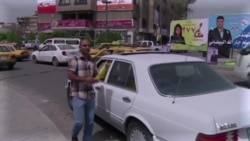WASHINGTON —
On April 30, Iraq will hold its first national election since U.S. military forces withdrew from the country in 2011. The voting will take place amid a surge of bloody violence and sectarian strife that has claimed thousands of lives.
In central Baghdad, posters of the candidates are everywhere. Many Iraqis are filing their registration papers to receive their voter ID cards.
The parliamentary elections are viewed as a key test for the country’s fledgling democracy.
Voters like Maath Mussab are hoping for change. “We hope that new faces will replace the current ones. We're tired of seeing the same faces for eight years. They have done nothing for us. We hope for a change, God willing.”
Increasing attacks
But the voting comes as Iraq is suffering from a surge in violence. Militants have used car bombings and suicide attacks in an attempt to derail the elections.
Former U.S. Ambassador to Iraq James Jeffrey said the turmoil is not a surprise.
“Democratic processes are always messy. They always look hopeless until, to quote Winston Churchill, 'you consider the alternative.' This is particularly so in countries that are developing democracies,” said Jeffrey.
Analysts say Prime Minister Nouri al-Maliki’s coalition is expected to do well on election day.
The prime minister’s position likely was strengthened when influential Shi’ite cleric Moqtada al-Sadr announced he was pulling out of Iraqi politics earlier this year.
Middle East expert Jonathan Schanzer said, “He [Nouri al-Maliki] has found a way to get a tighter and tighter grip on power. The expectation is that he will really emerge as the only game in town.”
Security concerns
Because of security concerns, voting is not expected to take place in Fallujah, in restive Anbar province. Hardline jihadists inspired by al-Qaida have taken over much of the city since January.
The Bagdad government has been striking back, but mostly on the outskirts of the city.
“And so the question is how much of a foothold are they going to gain? How much will the state of Iraq push back against these groups, or will they allow these areas of weak central authority to become overrun and remain in the hands of these jihadi groups?” asked Schanzer:
The United States has sent Hellfire air-to-surface missiles and other weapons to help Iraq fight the insurgents, but officials have made it clear American troops will not be involved.
And the upcoming election in Iraq appears to have generated little interest among the American public.
“There is a sense of disappointment and disenchantment with Iraq after we put so much into it," said former Ambassador Jeffrey. "And it didn’t turn out to look like Denmark. My feeling is it never was going to, but, nonetheless, the American people are a bit disillusioned. That is true.”
Analysts say that once a new parliament is elected, it could take months to negotiate a coalition government, since it's unlikely any party will win an outright majority.
In central Baghdad, posters of the candidates are everywhere. Many Iraqis are filing their registration papers to receive their voter ID cards.
The parliamentary elections are viewed as a key test for the country’s fledgling democracy.
Voters like Maath Mussab are hoping for change. “We hope that new faces will replace the current ones. We're tired of seeing the same faces for eight years. They have done nothing for us. We hope for a change, God willing.”
Increasing attacks
But the voting comes as Iraq is suffering from a surge in violence. Militants have used car bombings and suicide attacks in an attempt to derail the elections.
Former U.S. Ambassador to Iraq James Jeffrey said the turmoil is not a surprise.
“Democratic processes are always messy. They always look hopeless until, to quote Winston Churchill, 'you consider the alternative.' This is particularly so in countries that are developing democracies,” said Jeffrey.
Analysts say Prime Minister Nouri al-Maliki’s coalition is expected to do well on election day.
The prime minister’s position likely was strengthened when influential Shi’ite cleric Moqtada al-Sadr announced he was pulling out of Iraqi politics earlier this year.
Middle East expert Jonathan Schanzer said, “He [Nouri al-Maliki] has found a way to get a tighter and tighter grip on power. The expectation is that he will really emerge as the only game in town.”
Security concerns
Because of security concerns, voting is not expected to take place in Fallujah, in restive Anbar province. Hardline jihadists inspired by al-Qaida have taken over much of the city since January.
The Bagdad government has been striking back, but mostly on the outskirts of the city.
“And so the question is how much of a foothold are they going to gain? How much will the state of Iraq push back against these groups, or will they allow these areas of weak central authority to become overrun and remain in the hands of these jihadi groups?” asked Schanzer:
The United States has sent Hellfire air-to-surface missiles and other weapons to help Iraq fight the insurgents, but officials have made it clear American troops will not be involved.
And the upcoming election in Iraq appears to have generated little interest among the American public.
“There is a sense of disappointment and disenchantment with Iraq after we put so much into it," said former Ambassador Jeffrey. "And it didn’t turn out to look like Denmark. My feeling is it never was going to, but, nonetheless, the American people are a bit disillusioned. That is true.”
Analysts say that once a new parliament is elected, it could take months to negotiate a coalition government, since it's unlikely any party will win an outright majority.





